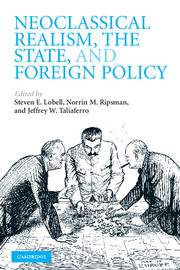Book contents
- Frontmatter
- Contents
- List of figures
- List of tables
- List of contributors
- Acknowledgments
- 1 Introduction: Neoclassical realism, the state, and foreign policy
- 2 Threat assessment, the state, and foreign policy: a neoclassical realist model
- 3 Neoclassical realism and strategic calculations: explaining divergent British, French, and Soviet strategies toward Germany between the world wars (1919–1939)
- 4 Neoclassical realism and identity: peril despite profit across the Taiwan Strait
- 5 Neoclassical realism and the national interest: presidents, domestic politics, and major military interventions
- 6 Neoclassical realism and domestic interest groups
- 7 Neoclassical realism and resource extraction: State building for future war
- 8 Neoclassical realism and state mobilization: expansionist ideology in the age of mass politics
- 9 The limits of neoclassical realism: additive and interactive approaches to explaining foreign policy preferences
- 10 Conclusion: The state of neoclassical realism
- Index
- References
9 - The limits of neoclassical realism: additive and interactive approaches to explaining foreign policy preferences
Published online by Cambridge University Press: 05 June 2012
- Frontmatter
- Contents
- List of figures
- List of tables
- List of contributors
- Acknowledgments
- 1 Introduction: Neoclassical realism, the state, and foreign policy
- 2 Threat assessment, the state, and foreign policy: a neoclassical realist model
- 3 Neoclassical realism and strategic calculations: explaining divergent British, French, and Soviet strategies toward Germany between the world wars (1919–1939)
- 4 Neoclassical realism and identity: peril despite profit across the Taiwan Strait
- 5 Neoclassical realism and the national interest: presidents, domestic politics, and major military interventions
- 6 Neoclassical realism and domestic interest groups
- 7 Neoclassical realism and resource extraction: State building for future war
- 8 Neoclassical realism and state mobilization: expansionist ideology in the age of mass politics
- 9 The limits of neoclassical realism: additive and interactive approaches to explaining foreign policy preferences
- 10 Conclusion: The state of neoclassical realism
- Index
- References
Summary
The central purpose of this volume is to evaluate the relative weight of domestic and international factors in determining the national security behavior of states. The neoclassical realist agenda that Jeffrey Taliaferro, Steven Lobell, and Norrin Ripsman lay out in their introductory essay seeks to accomplish this task by viewing domestic interests and institutions as an imperfect transmission belt that can frequently ignore or distort objective international circumstances, thereby affecting national policy. As I will argue in this chapter, however, their neoclassical assumption that domestic and international pressures are easily separable and identifiable is problematic. The nature of international threats is determined to a great extent by the interests of the domestic coalition that governs the state, and domestic political and economic interests are affected by international circumstances. Therefore, it makes little sense to treat domestic and international variables in an additive manner, by assuming an objective set of national interests and seeing how domestic political actors respond to them. Instead, I propose an interactive model that considers how the interaction between domestic interests and the international political environment determines foreign security policy choices. My model considers the interaction between subnational political actors and the international environment when theorizing about the preferences of domestic political actors, including state policy-makers. I will illustrate the explanatory advantages of this approach by examining the changing positions of domestic political factions on American national security policy during the Cold War era.
- Type
- Chapter
- Information
- Neoclassical Realism, the State, and Foreign Policy , pp. 251 - 279Publisher: Cambridge University PressPrint publication year: 2009
References
- 5
- Cited by



